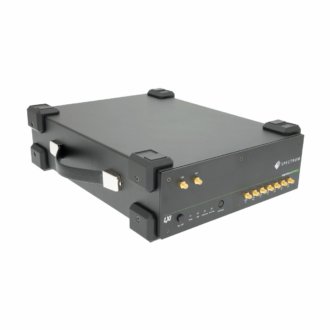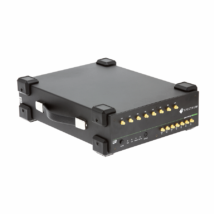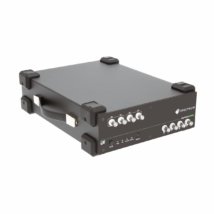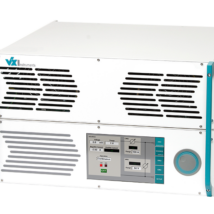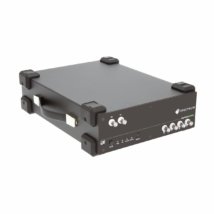| DN2.221-02 | LXI multi-purpose digitizers 8-bit 2 channels 1.25 Ge/s | |
| DN2.221-04 | LXI multi-purpose digitizers 8-bit 4 channels 1.25 Ge/s | |
| DN2.221-08 | LXI multi-purpose digitizers 8-bit 8 channels 1.25 Ge/s | |
| DN2.222-02 | LXI multi-purpose digitizers 8-bit 2 channels 2.5 Ge/s | |
| DN2.222-04 | LXI multi-purpose digitizers 8-bit 4 channels 2.5 Ge/s | |
| DN2.223-02 | LXI multi-purpose digitizers 8-bit 2 channels 5 Ge/s | |
| DN2.225-04 | LXI multi-purpose digitizers 8-bit 1 channel 5 Gs/s 2 channels 2.5 Gs/s or 4 channels 1.25 Gs/s | |
| DN2.225-08 | LXI multi-purpose digitizers 8-bit 2 channel 5 Gs/s 4 channels 2.5 Gs/s or 8 channels 1.25 Gs/s |
NETBOX DN2.22x Serie - 8-bit 2/4/8 channels LXI digitizers versatile 1.25 Gs/s, 2.5 Gs/s or 5 Gs/s sampling speed
- Sampling 1.25Ge / s on 2/4/8 channels, 2.5Ge / s on 2/4 channels and 5 Ge / s on 1/2 channels
- Bandwidth 500 MHz or 1.5 GHz
- A separate ADC 8 Bits and amplifier per channel
- Simultaneous sampling on all channels
- 4 input ranges: ± 200 mV up to ± 2.5 V
- Optional input range: ± 40 mV up to ± 500 mV
- Window, reset, OR / AND trigger
- Integrated full calibration circuit
- High Bandwidth Scanner
- GBit Ethernet / LXI compatible instrument
- Easy connection with BNC / SMA connections
- SBench 6 Professional included
- Direct remote access from workstations or laptops
- Simple integration into the factory LAN
The digitizerNETBOX DN2.22x series allows recording of up to 8 channels with sampling rates of 5 GS/s and a bandwidth of 1.5 GHz. These Ethernet Remote instruments offer outstanding A/D features both in bandwidth and signal quality. The combination of high sampling rate and resolution makes these digitizers the top-of-the-range for applications that require high speed signal acquisition. The digitizerNETBOX can be installed anywhere in the company LAN and can be remotley controlled from a host PC.
The digitizerNETBOX and generatorNETBOX offer a powerful GBit Ethernet connection and are fully LXI compatible. The netbox can be used as tabletop instrument or 19″ rack mount operation. It can be connected anywhere in your LAN or directly point-to-point with your Laptop/Workstation. A full option package and software package including SBench 6 Professional is included. The first data acquisition can be done within minutes: connect power + ethernet + signals, swicth on, install software on client PC, detect the digitizerNETBOX/generatorNETBOX with Discovery, start SBench 6, do the first acquisition
ABA Mode
The optional ABA mode combines slow continuous data recording with fast acquisition on trigger events. The ABA mode works like a slow data logger combined with a fast digitizer. The exact position of the trigger events is stored as timestamps in an extra memory.
The ring buffer mode is the standard mode of all acquisition boards. Data is written in a ring memory of the board until a trigger event is detected. After the event the posttrigger values are recorded. Because of this continuously recording into a ring buffer there are also samples prior to the trigger event visible: Pretrigger = Memsize – Posttrigger.
The FIFO mode is designed for continuous data transfer between the digitizerNETBOX and the host PC. The transfer speed is depending on the Ethernet connection between box and host and is in the region of 40 MB/s to 60 MB/s. The control of the data stream is done automatically by the driver on interrupt request. The complete installed on-board memory is used for buffer data, making the continuous streaming extremely reliable.
Using a dedicated connector a sampling clock can be fed in from an external system. It’s also possible to output the internally used sampling clock to synchronize external equipment to this clock.
The option to use a precise external reference clock (normally 10 MHz) is necessary to synchronize the board for high-quality measurements with external equipment (like a signal source). It’s also possible to enhance the quality of the sampling clock in this way. The driver automatically generates the requested sampling clock from the fed in reference clock.
The internal sampling clock of the card is generated using a high precision PLL. This powerful device allows to select the sampling rate with a fine step size making it possible to perfectly adopt to different measurement tasks. Most other cards on the market only allow the setup of fixed sampling rates like 100 MS/s, 50 MS/s, 25 MS/s, 10 MS/s, … without any possibility to set the sampling rate to any value in between.
The on-board calibration can be run on user request and calibrates the amplifier against a dedicated internal high precision calibration source. After this calibration data is stored permanently in an on-board EEPROM and is automatically used for further acquisitions.
The analog inputs can be adapted to real world signals using individual settings for each channel. A large number of different input ranges and a programmable input offset allow to adopt perfectly to the real world signals.
All acquisition cards from Spectrum are built with a completely synchronous design. Every channel has its own independent input amplifier as well as an independent ADC allowing to program all input channel related settings individually for each channel.
With a simple software command the inputs can individually be switched from single-ended (in relation to ground) to differential, without loosing any inputs. When the inputs are used in differential mode the A/D converter measures the difference between two lines with relation to system ground.
Most of the Spectrum A/D cards offer a user programmable signal offset opening the Spectrum boards to a wide variety of setups. The signal offset at least covers a range of +/-100 % of the currently selected input range making unipolar measurements with the card possible. Besides this the input range offset can be programmed individually allowing a perfect match of the A/D card section to the real world signal.

